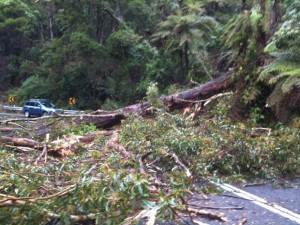 We had an educational brush with uncertainty while driving home last night.
We had an educational brush with uncertainty while driving home last night.
My weekly commute is a 2.75 hour drive from where I am working in Canberra to our home in Merimbula. One feature of the trip is the rather steep and twisting stretch down Brown Mountain.
Last night was pretty unusual, as you can see in the picture a very large tree decided to fall across the road. It was a lot more exciting for the guy at the head of the line of cars, it fell right in front of him. He demonstrated remarkable agility by stopping before he hit the tree.
We arrived a few minutes later.
Had I ever considered this risk? Not at all, nor did I immediately have a contingency plan.
I would not even have known the probability of very large trees, on very steep slopes, with very wet ground from heavy rain storm, falling down. However I quickly came to learn about the impact of this piece of uncertainty on my objective (which was to get home and open a bottle of wine)!
The unconsidered risk had been realised – and this road was going to be blocked for hours, in both directions.
Not a problem you think, but we had no redundancy here. The picture links to a Google Map of the area, take a look and you will see that there are not a lot of roads that take you down the mountain range in this part of the country. My initial thought was it would take over 5 hours to take a detour – weekend in ruins.
Fortunately my wife had called to warn a colleague about the incident and was given advice about a route we did not know. A little longer in distance, but very narrow and twisting through the mountains.
The moral of this story?
- You will never know all the risks you face, so be ready to deal with the impact of surprises.
- Redundancy is not the only answer, you need to be able to adapt – and to be agile enough in your operations to change your operations when forced.
- Successfully dealing with disruptions increases our capacity for resilience.
- Every little disruption helps us to get better prepared for the bigger events
- We need to learn from our experiences and the near misses that impact our organisations.
- We learn how to adapt to different operating environments, with different risks and threats than our normal world.
- When you are disrupted by an event you had not thought about – it helps to have friends and know people who can help.
- That means networking and building a community for support – and you have to have this in place before something happens.
- No person or organisation is going to become resilient on their own, in this connected age you need the support of a network and your value chain when you face a disruption.
- Technology helps, but it is not a substitute for the human element
- You see I didn’t mention there is not a lot of cell phone coverage in this area either, and once we started the detour we quickly went out of range – on our own to find the way.
Have you been disrupted lately?
What did you learn from the experience? How has it made you better?
Leave a Reply